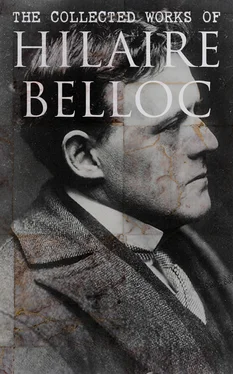To what emotion shall I compare this astonishment? So, in first love one finds that _this_ can belong to _me._
Their sharp steadfastness and their clean uplifted lines compelled my adoration. Up there, the sky above and below them, part of the sky, but part of us, the great peaks made communion between that homing creeping part of me which loves vineyards and dances and a slow movement among pastures, and that other part which is only properly at home in Heaven. I say that this kind of description is useless, and that it is better to address prayers to such things than to attempt to interpret them for others.
These, the great Alps, seen thus, link one in some way to one's immortality. Nor is it possible to convey, or even to suggest, those few fifty miles, and those few thousand feet; there is something more. Let me put it thus: that from the height of Weissenstein I saw, as it were, my religion. I mean, humility, the fear of death, the terror of height and of distance, the glory of God, the infinite potentiality of reception whence springs that divine thirst of the soul; my aspiration also towards completion, and my confidence in the dual destiny. For I know that we laughers have a gross cousinship with the most high, and it is this contrast and perpetual quarrel which feeds a spring of merriment in the soul of a sane man.
Since I could now see such a wonder and it could work such things in my mind, therefore, some day I should be part of it. That is what I felt.
This it is also which leads some men to climb mountain-tops, but not me, for I am afraid of slipping down.
Then you will say, if I felt all this, why do I draw it, and put it in my book, seeing that my drawings are only for fun? My jest drags down such a memory and makes it ludicrous. Well, I said in my beginning that I would note down whatever most impressed me, except figures, which I cannot draw (I mean figures of human beings, for mathematical figures I can draw well enough), and I have never failed in this promise, except where, as in the case of Porrentruy, my drawing was blown away by the wind and lost--- if anything ever is lost. So I put down here this extraordinary drawing of what I saw, which is about as much like it as a printed song full of misprints is to that same song sung by an army on the march. And I am consoled by remembering that if I could draw infinitely well, then it would become sacrilege to attempt to draw that sight. Moreover, I am not going to waste any more time discussing why I put in this little drawing. If it disturbs your conception of what it was I saw, paste over it a little bit of paper. I have made it small for the purpose; but remember that the paper should be thin and opaque, for thick paper will interfere with the shape of this book, and transparent paper will disturb you with a memory of the picture.
It was all full of this, as a man is full of music just after hearing it, that I plunged down into the steep forest that led towards the great plain; then, having found a path, I worked zig-zag down it by a kind of gully that led through to a place where the limestone cliffs were broken, and (so my map told me) to the town of Soleure, which stands at the edge of the plain upon the river Aar.
I was an hour or more going down the enormous face of the Jura, which is here an escarpment, a cliff of great height, and contains but few such breaks by which men can pick their way. It was when I was about half-way down the mountain side that its vastness most impressed me. And yet it had been but a platform as it were, from which to view the Alps and their much greater sublimity.
This vastness, even of these limestone mountains, took me especially at a place where the path bordered a steep, or rather precipitous, lift of white rock to which only here and there a tree could cling.
I was still very high up, but looking somewhat more eastward than before, and the plain went on inimitably towards some low vague hills; nor in that direction could any snow be seen in the sky. Then at last I came to the slopes which make a little bank under the mountains, and there, finding a highroad, and oppressed somewhat suddenly by the afternoon heat of those low places, I went on more slowly towards Soleure.
Beside me, on the road, were many houses, shaded by great trees, built of wood, and standing apart. To each of them almost was a little water-wheel, run by the spring which came down out of the ravine. The water-wheel in most cases worked a simple little machine for sawing planks, but in other cases it seemed used for some purpose inside the house, which I could not divine; perhaps for spinning.
All this place was full of working, and the men sang and spoke at their work in German, which I could not understand. I did indeed find one man, a young hay-making man carrying a scythe, who knew a little French and was going my way. I asked him, therefore, to teach me German, but he had not taught me much before we were at the gates of the old town and then I left him. It is thus, you will see, that for my next four days or five, which were passed among the German-speaking Swiss, I was utterly alone.
This book must not go on for ever; therefore I cannot say very much about Soleure, although there is a great deal to be said about it. It is distinguished by an impression of unity, and of civic life, which I had already discovered in all these Swiss towns; for though men talk of finding the Middle Ages here or there, I for my part never find it, save where there has been democracy to preserve it. Thus I have seen the Middle Ages especially alive in the small towns of Northern France, and I have seen the Middle Ages in the University of Paris. Here also in Switzerland. As I had seen it at St Ursanne, so I found it now at Soleure. There were huge gates flanking the town, and there was that evening a continual noise of rifles, at which the Swiss are for ever practising. Over the church, however, I saw something terribly seventeenth century, namely, Jaweh in great Hebrew letters upon its front.
Well, dining there of the best they had to give me (for this was another milestone in my pilgrimage), I became foolishly refreshed and valiant, and instead of sleeping in Soleure, as a wise man would have done, I determined, though it was now nearly dark, to push on upon the road to Burgdorf.
I therefore crossed the river Aar, which is here magnificently broad and strong, and has bastions jutting out into it in a very bold fashion. I saw the last colourless light of evening making its waters seem like dull metal between the gloomy banks; I felt the beginnings of fatigue, and half regretted my determination. But as it is quite certain that one should never go back, I went on in the darkness, I do not know how many miles, till I reached some cross roads and an inn.
This inn was very poor, and the people had never heard in their lives, apparently, that a poor man on foot might not be able to talk German, which seemed to me an astonishing thing; and as I sat there ordering beer for myself and for a number of peasants (who but for this would have me their butt, and even as it was found something monstrous in me), I pondered during my continual attempts to converse with them (for I had picked up some ten words of their language) upon the folly of those who imagine the world to be grown smaller by railways.
I suppose this place was more untouched, as the phrase goes, that is, more living, more intense, and more powerful to affect others, whenever it may be called to do so, than are even the dear villages of Sussex that lie under my downs. For those are haunted by a nearly cosmopolitan class of gentry, who will have actors, financiers, and what not to come and stay with them, and who read the paper, and from time to time address their village folk upon matters of politics. But here, in this broad plain by the banks of the Emmen, they knew of nothing but themselves and the Church which is the common bond of Europe, and they were in the right way. Hence it was doubly hard on me that they should think me such a stranger.
Читать дальше












